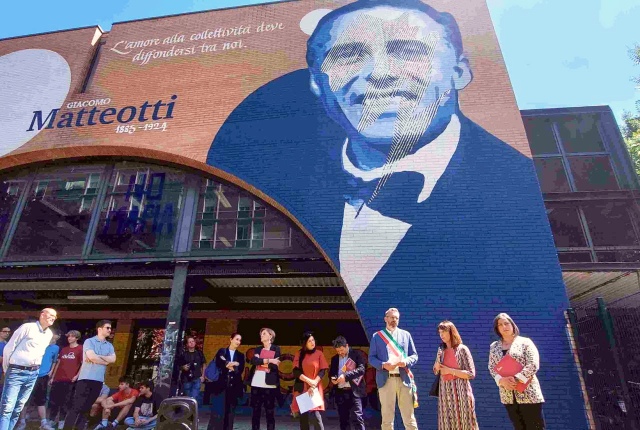Bologna honours Giacomo Matteotti: the city commemorates the socialist and antifascist leader on the centenary of his death

The programme begins today with the unveiling of a mural depicting Giacomo Matteotti by artist Chekos on the facade of the Liceo Copernico. This marks the start of a series of cultural events dedicated to the socialist and antifascist deputy, a student and graduate of the University of Bologna, on the centenary of his assassination on 10 June, 1924.
On Monday 10 June, a plaque will be placed at Matteotti's former residence in Bologna in Via Fondazza, where he lived as a student in Bologna, and a light installation will be lit on Via Matteotti during the evening.
The events will continue in the fall. In October, the University of Bologna's Contemporary Poetry Center will host an event titled "Poetry Under and/or Against Fascism" and on 9 October at 9 PM, there will be a discussion moderated by Alessandra Sardoni at the Pandora Festival. The discussion will revolve around Antonio Funiciello's book on Matteotti, with contributions from Paolo Pombeni and Sofia Ventura.
On 6 November at 6 PM, at Salaborsa, Mirko Grasso will present his book "The Opponent: Matteotti Against Fascism” (Carocci, 2024), alongside historians and professors from the Alma Mater's Department of History, Cultures, and Civilizations of the University of Bologna.
The book traces Matteotti's political and intellectual journey, emphasizing his European reformist roots, militant socialist commitment, organizational skills, and legal scholarship, as well as all the fundamental elements to explain his struggle against the emerging fascist regime and the strenuous battle for democracy he carried out, at the cost of his life.
The European Museum of Students (MEUS) of the Sistema Museale di Ateneo (via Zamboni, 33) will host an exhibition titled "Of Noble Intellect and Good Heart: Matteotti as a Student at the University of Bologna".
The exhibition will open on 7 November, the anniversary of Matteotti’s death, and will run until 3 January, 2025, commemorating a hundred years since Mussolini's speech on the Matteotti murder that marked the beginning of the fascist regime. Curated by Patrizia Dogliani and Mirko Grasso, the exhibition will showcase documents and materials from Matteotti's university days, illustrating the academic environment, relationships with professors and peers, and his engagement with the city's intellectual life. The exhibition will feature documents and materials from his university years, mainly sourced from the Historical Archive of the University of Bologna, organized into three thematic sections: "The University of Bologna in Matteotti's Time", "Matteotti as a Student in Bologna (1903-1907)" and "Professors and Friends During the Bolognese Period".
On Thursday, 7 November, the final event of the celebrations in memory of Giacomo Matteotti will take place at 6 PM in the Aula Absidale of Santa Lucia (via de’ Chiari, 25/a) with the play “Giacomo. A Dramatic Art Intervention in the Political Sphere”. This co-production by Teatro dei Borgia and Artisti Associati Gorizia, directed by Gianpiero Borgia and starring Elena Cotugno, juxtaposes two of Matteotti's parliamentary speeches: the first one on 31 January, 1921, where he denounced the collusion between bourgeois political forces and fascist squads, and the second one on 30 May: 1924, his final session before being assassinated, where he contested the results of the April elections of that year.
This politically charged tragedy reenacts Matteotti's words in their stark and horrifying truth. The work encourages reflection on political activism, citizenship rights, resistance to fascist violence through the values of freedom and democracy, and the role of theatre in society, transforming ideals into a work of art.






